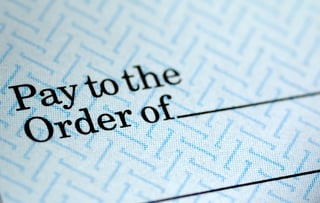 I’ve been writing recently about how distribution enterprises can improve their profitability through more efficient operations. In this and my next two posts, I want to shift gears and discuss how distributors (and all businesses, for that matter), can do more to protect the money they earn.
I’ve been writing recently about how distribution enterprises can improve their profitability through more efficient operations. In this and my next two posts, I want to shift gears and discuss how distributors (and all businesses, for that matter), can do more to protect the money they earn.
Fraud and theft are serious problems for small to mid-size businesses. The Association of Certified Fraud Examiners has estimated that globally, businesses lose about 5% of revenue to these types of crimes each year, with a median loss of $150,000. That’s not an insignificant sum for a small business to recoup.
What you don’t know about check fraud can really hurt your business.
Of all the risks we deal with as business owners, one of the biggest is one you may not think about: check fraud.
As individuals, we take for granted that consumer fraud protection laws will shield us from credit card and check fraud. But those laws do NOT extend to commercial accounts.
A number of credit card companies have policies in place that offer a liability limit on commercial account fraud. However, commercial checking accounts rarely offer such protections, and it’s not too hard to understand why.
Most of us don’t keep a great deal of money in our personal checking accounts. However, a business checking account may have millions deposited to cover payroll, inventory purchases, debt payments, and other expenses. It would be prohibitive for financial institutions to protect such large accounts from business fraud without passing along a major cost to customers.
Your bank account is more vulnerable than you may think.
You may not realize how easy it is for someone to fraudulently charge your bank account. Anyone with access to a copy of one of your checks has your bank routing number—and that’s all he or she needs to create a counterfeit check or, more likely and quickly, to debit your account electronically. You can see how critical fraud prevention is to any business.
 Your A/P department cuts checks weekly, if not daily. When you consider the thousands of people who see your bank routing number, it’s easy to see how fraud can be so common. (How common? In 2015, 73% of companies were targets of one or more types of payment fraud.)
Your A/P department cuts checks weekly, if not daily. When you consider the thousands of people who see your bank routing number, it’s easy to see how fraud can be so common. (How common? In 2015, 73% of companies were targets of one or more types of payment fraud.)
Do these 3 things to better protect your company.
1. Review the charges against your account daily.
It only takes a few minutes online, and you (or someone in your accounting department) can start today. Be especially watchful for unfamiliar low-dollar debits—they can indicate that a perpetrator is testing the system’s defenses. He knows it’s easier to fly under the radar with frequent small charges. He assumes that the more regularly his small charges appear, the more he’ll look like a normal vendor and the less likely you’ll be to question the debits. The sooner you identify a fraudulent charge, the better the chances are that you will recover the money or at least contain the damage.
2. Open a secondary account with much more controlled access.
Transfer funds as needed from this higher-balance account to and from your checking account. Keep access to this account restricted to just a handful of trusted people. The idea is to limit the amount of money in your primary checking account, in effect creating a financial firewall and minimize potential losses from check fraud.
3. Institute an automated fraud detection system through your bank.
Most banks today offer Positive Pay or a similar service to help secure your account. There are usually fees charged, but in my opinion these services are a bargain for the protection they provide. Here’s how they work:
- You send your bank a daily register of the checks you’ve written.
- Your bank matches the charges to your account against those checks.
- When a charge is made that is not on the list, the bank will alert one or more people at your company who then have a limited amount of time to approve or deny payment.
- The approval can be done through a computer or even on a smart phone with the appropriate security.
- If the time allotted to respond is exceeded, the charge is automatically denied.
You may also be able to create an automated feed from your accounting system. Doing so would further reduce your effort by having your accounting system generate and send the list of uncashed checks to your bank’s system. With those procedures in place, the additional effort on your staff is minimal and the enhanced security and peace of mind for you is priceless.
This article is the first of a three-part series about protecting your business from fraud and theft. In my next post, we’ll cover internal theft. In the final article, we will focus on IT security. Subscribe to the Expertek Blog and you won’t miss a post. See “Subscribe to Email Updates” at the top right of this page.





